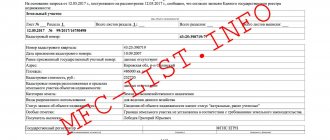One can only guess how the prejudice appeared and took hold that it is immeasurably more difficult to leave an individual house than to leave an apartment. That for this it is necessary to collect significantly more documents.
Perhaps it dates back to Soviet times, when almost all apartments were owned by the state, and houses could be private.
To register a residence permit, they required a “house book” - a special type of document, about which most people had only the most approximate idea. And when they heard that in order to deregister, an “extract from the house register” was needed, people fell into a slight panic, not understanding where to get it.
Then the situation with home ownership changed, and the concept of “house register” remained in the regulations for registration and deregistration. Continuing to scare those who want to register or cancel registration at a particular address in the private sector.
We would like to reassure you right away - leaving a private house is no more difficult than leaving an apartment (privatized or municipal). This article is dedicated to this issue.
First about the house book
To “dot the t's” - in 2020 there are no more house books in Russia. They were abolished a little earlier, during the transfer of functions of registration of citizens from one department to another.
But in fact, it was a document necessary for a private homeowner, and kept by him.
Since private houses were never part of the state housing stock, some housing authorities did not keep records of registration and check-out of their residents. They only prepared the house register, and then the owner of the house made all the entries himself.
Finding a house register sometimes really became a problem. If a family lived in a house for decades, without registering or registering anyone, they forgot about the book, and it could get lost. This happened especially often with houses received by inheritance. Obtaining a duplicate was not particularly difficult, but the trouble was that the duplicate was “clean”, and it was really difficult to restore the history of registrations and extracts at this address.
But let’s return to our time, to the norms that are relevant at the moment.
Until 2020, registration/discharge was handled by the FMS - Federal Migration Service. Currently – UVM (Office for Migration Issues). Accordingly, the administrative regulations changed and there was a transition to electronic document management. This happened in accordance with Order of the Ministry of Internal Affairs No. 984. The order came into force in April 2020. Now you don't need to keep a house register. And receive extracts from it too.
All information about residents is stored electronically in the Department of Internal Affairs of the Ministry of Internal Affairs, and from there it is taken by everyone who needs it and who has the right to receive this information by law.
So no one has the right to demand from a citizen an extract from the house register. Registration is confirmed by an adult’s passport and a special registration certificate for children issued by the Housing Office.
House book - what kind of document is it and why was it needed?
The book we are considering is a journal that records who lives at a certain address. That is, the registration of people is recorded. Records are kept of both permanent and temporary residence.
Let's consider the legal regulation of this issue:
- Law No. 5242-1 of June 25, 1993 established the mandatory registration of citizens at their place of residence.
- The rules for recording the place of residence in 1995 appointed those responsible for maintaining this record.
- From January 1, 2014, registration functions in rural areas were transferred to the Federal Migration Service.
- Order of the FMS No. 288 of September 11, 2013 “On approval of the administrative regulations for the provision by the Federal Migration Service of state services for registration of citizens of the Russian Federation at the place of stay and place of residence within the Russian Federation” approved the forms of the house register - No. 10 and No. 11.
Attention! These laws have now been repealed by order of the Ministry of Internal Affairs of Russia dated December 31, 2017 No. 984 “On approval of the Administrative Regulations of the Ministry of Internal Affairs of the Russian Federation for the provision of public services for registration of citizens of the Russian Federation at the place of stay and place of residence within the Russian Federation.”
In April 2020, all functions of the Federal Migration Service for recording the places of residence and stay of citizens of the Russian Federation were officially transferred to the bodies of the Ministry of Internal Affairs.
In the article, we will first look at all the features of house books that were in force until 2020, and then at the new rules introduced by Order No. 984 of the Ministry of Internal Affairs.
Watch this video to learn even more:
House book forms
Why was this document needed, in what situations was it required?
- When buying and selling a house/apartment.
- To obtain a certificate of registration of an individual at a specific address.
- To obtain a special certificate about all residents living at a specific address.
- When receiving a passport for minors.
- To replace a passport if it is lost, as well as when replacing it.
- To obtain citizenship for a newborn if the parents have a residence permit.
- When a child enters kindergarten and school.
- During a divorce.
- To receive benefits (veterans, families with many children).
There were basic forms of registration of citizens:
- form No. 10 – for residents of apartment buildings;
- No. 11 – for private households;
- No. 18 – was conducted by officials.
Let's look at these forms in more detail.
For an apartment
For residents of apartment buildings, apartment cards of form No. 10 were issued.
The management company or HOA was responsible for their maintenance.
The cards were filled out by company employees and submitted to the Federal Migration Service for registration. They were stored in the file cabinet of the management company/homeowners association. They were not handed out to residents. If necessary, residents took an extract about their place of residence.
It is worth noting that maintaining apartment cards was not one of the main responsibilities of management companies. Therefore, a special agreement was concluded between the management company and the owners.
If there was no agreement, then the tenants independently started a house book, form No. 11.
For a private house
Maintaining a house register for a private house was mandatory. It was conducted according to form No. 11.
Consisted of 3 main sections:
- title page, where the title of the document and address are written;
- information about the owner - last name, first name, patronymic, when residential real estate was acquired, share;
- information about registered citizens - their passport details, as well as the number and series of the passport itself (for minors - birth certificate).
Officials who were responsible for maintaining house books and registering citizens kept a log of form No. 18. The difference between these forms was that in the second case, not only the data of registered citizens is entered, but also information about the person responsible for maintaining the house of residence.
House book form No. 11 and No. 18.
A sample form is provided here.
However, these links are unlikely to be useful to you, because there is no longer a need to make such a book for home owners in the private sector.
Due to changes in the law, the recreation center can be archived or kept.
Where is it issued?
The buyer of an apartment or private house receives a house book from the previous owner. When purchasing housing in a new building, equity holders independently create a new book for registering residents. You can buy it in a special store, order it from the Department of the Ministry of Internal Affairs at the place of registration of housing, or contact the MFC . Filling out the DC occurs after affixing the stamps of the registering authority. Thus, only the owner of the apartment can have the accounting book.
Example:
Borisova N.S. participated in the privatization of an apartment together with her father and brother. In fact, only the father lived in the apartment. Immediately after privatization, Borisova and her brother moved to another city. After purchasing a new home, the woman decided to check out of the apartment. However, at the Department of Internal Affairs of the Ministry of Internal Affairs, she, as the owner of the property, was required to provide a house register. The accounting journal was kept by her father, with whom Borisova had not maintained contact for 10 years.
My father refused all requests to send me a house register, which delayed registration. Lawyers advised Borisova to write a statement addressed to the head of the Internal Affairs Directorate of the Ministry of Internal Affairs. The woman followed the advice and filed a statement. She indicated that she is the owner of the apartment and is deregistered at her place of registration, but the house register is with her father. The head of the department reviewed the application and allowed Borisova to be deregistered without a recreation center. The discharge took place on the basis of a passport and title documents for a new apartment.
How much did it cost and where did you buy it?
The price of a house book depended on the binding and number of pages. A soft cover with a small number of pages cost 25-30 rubles. A 48-sheet hardcover magazine cost up to 300 rubles. Such books were created mainly for private houses.
Be sure to read it! Common shared and joint property: the difference, which is better
They were sold in stationery stores, sometimes in regional FMS offices.
The law allowed self-printing of forms. But the FMS did not always accept them.
After switching to electronic document management, these costs are a thing of the past. Certificates, statements, and the entire registration procedure are now free of charge.
How to register a house register for a private house in 2020
Let us remind you once again that this issue is not relevant this year! Why - see above in the article.
The house register was prepared by authorized employees of the Federal Migration Service. To obtain it, forms No. 11 were first purchased (see previous paragraph).
Next, an application was submitted for the issuance of a DC. It was written in free form. Look here for a correctly composed sample of his writing.
The next step was to fill it out, certify it with signatures and seals. Well, actually the issuance to the applicant.
It took 5 working days to complete all documents. This period is extended if additional information is requested from the property owner or municipal authorities.
When registering the book, the FMS employee wrote down the home address on the title page. Next came information about the owner and those living in the residential premises.
Each entry was certified with a signature and seal. It was they who gave the form the force of a legal document indicating the presence of registration at a specific address.
All data was duplicated in a special journal, which was stored in the Federal Migration Service.
The owner did not have the right to fill out the book himself.
Note:
- Only the owner of the residential premises could register a house register;
- when the owner changed, this document did not need to be replaced, new data was simply entered into it;
The book itself was not the title document for the house. First, a purchase and sale agreement was drawn up, or the heir entered into the right of inheritance. And already on the basis of these documents, changes were made to the DC.
Documents that were necessary to obtain the book
To obtain the book, a whole package of papers was required:
- the applicant's identity card;
- house register form;
- real estate certificate;
- a copy of the cadastral passport (for a private house) or an extract from the Unified State Register of Real Estate;
- purchase and sale agreement, will, deed of gift (one of the above).
If the DC was already carried out, then it was also provided.
Now, to register, fill out an application in Form 1 and a questionnaire. The only required papers were a passport, a document serving as the basis for registration (for example, a will) and an arrival address sheet. No one will demand a house book!
Templates for all documents are downloaded on the Gosulugi website. It also provides step-by-step information about the registration procedure at the place of residence/stay.
Don’t forget, original documents and notarized copies are shown.
Is it cancelled, in what cases is it not needed?
Starting from 2020, public and private organizations (banks, notaries, schools, kindergartens) do not have the right to demand house books due to their abolition! They were replaced by special certificates.
What changed?
First of all, the time required to complete documents has been reduced. No need to stand in hours-long queues. You can submit your application without leaving your home. And just come to the Ministry of Internal Affairs or the MFC for a completed certificate.
Let's hope that these measures will make life much easier and reduce bureaucratic red tape.
Is it possible to leave home?
In order to be discharged from somewhere, you first need to register there. So, first of all, let’s find out how you can end up registered in a private house?
This is done in agreement with the owner, and is not much different from registration in an apartment. You can conclude a temporary residence agreement with the owner and, on this basis, register temporary registration in his house.
You can register on a permanent basis, with the consent of the owner of the house and in accordance with the provisions of Government Decree No. 713 (of 1995).
- If the registration is temporary, it will expire when it expires. Registration can be canceled prematurely in court if the tenant has violated the terms of the contract or the rule of law.
- If a citizen is registered on a permanent basis, he can either leave at will or be forcibly deregistered through a legal process initiated by the owner.
The owner must have valid grounds for forced eviction, as specified in the statement of claim. For example, a registered citizen’s refusal to pay utility bills, his antisocial behavior, which makes it impossible to live with him in the same apartment, or his commission of a criminal offense.
What does it take to leave home?
Russian regulatory documents establish that for each residential building it is necessary to create a house register and, throughout the entire period of its operation, take into account information about each of the residents. To cancel registration in a private house, you need to submit a house book to make an entry in it about the departure of the registered citizen.
If the owner of the house does not need this entry in the book, he may not give it when checking out, but make them later by contacting the Department of Internal Affairs of the Ministry of Internal Affairs of the Russian Federation.
The form is purchased by the owner of a private house, who is also its custodian. The registration of the house register is carried out by employees of the Department of Internal Affairs of the Ministry of Internal Affairs of the Russian Federation. They stitch it, seal it
. The document is issued in the following cases:
- when putting the house into operation;
- in case of loss;
- in case of damage to a previously issued book.
Canceled or completely completed house books are not submitted to the city archives. Only the owners of residential buildings are responsible for their storage.
. The law does not establish a fine for the loss or damage of these documents.
Can this be done without the owner?
The voluntary discharge of a tenant does not require permission or approval from the owner of the house. Not only does it not need to be taken with you to the Department of Internal Affairs of the Ministry of Internal Affairs, but it is also not necessary to notify you that you are being discharged. In principle, you can even “skip” the deregistration operation itself - just submit an application for registration at a new address.
The UVM inspector who accepted the application will himself send a request, according to which the citizen will be removed from his previous registration address.
It is impossible to register in a private house without the consent of its owner. To obtain registration, you will need his written consent and presence when applying for registration. And you can even sign out with a power of attorney.
Example
Citizen A, living as a lodger in the private house of owner B in Ryazan, was sent on a long business trip to Moscow, where he required temporary registration. Not wanting to make an extra trip to Ryazan for discharge, A called his friend S. He agreed with him about assistance, after which he sent S a notarized power of attorney, an application for discharge, and his passport. S submitted an application for A’s discharge to the Department of Internal Affairs, handed over his passport, and then received it back with a discharge stamp. And sent it by courier to Ryazan.
The question may arise, why was all this necessary for A, if he could simply submit an application for registration at a new address, and the Department of Internal Affairs itself would remove him from the old registration? Simply because this operation would take more time. The request would have gone through unhurried “bureaucratic” channels from Moscow to Ryazan, stayed there for the duration of processing, and then returned back the same way. All this time, A would have to do without a passport, having only a temporary identity card, which is not always convenient. Extract in person (or by proxy) took only 3 days.
How to check out of a house without an owner?
The presence of the owner of a private house is not necessary if the applicant simultaneously registers in another residential area. This can be done through the MFC, and through the Department of Internal Affairs of the Ministry of Internal Affairs of the Russian Federation, and through the Internet portal “Public Services”.
When visiting the authorized bodies, you will need a civil passport of the Russian Federation, documents for the right to own the living space, or permission from the owner certified by a notary, or the personal presence of the owner of the living space.
To register at another address, you must fill out the form “Application for registration at the place of residence.” It contains the following information:
- Name of the territorial department carrying out registration.
- Information about the applicant.
- Former residence address.
- Full name of the owner of the premises, series and number of the certificate of ownership of the real estate.
- Address of the new living space.
- Passport and SNILS details.
- Signature and passport details of the owner of the premises.
Simultaneously with this document, an application for termination of registration is filled out. It must indicate:
- The name of the department of the Department of Internal Affairs of the Ministry of Internal Affairs of the Russian Federation, responsible for maintaining records of the residence of citizens in this territory.
- Personal information.
- Passport details.
- New address.
- The name of the territorial body responsible for registration at the previous place of residence.
- The address of the accommodation from which you need to check out.
- SNILS number.
- Signature of the applicant and date of preparation of the document.
The deregistration procedure is completely free. Depending on the institution to which the documents were submitted, the period for providing the service is:
- passport office at the Housing Office - 1 week;
- Department of Internal Affairs of the Ministry of Internal Affairs of the Russian Federation, Internet portal “State Services” – 3 working days;
- MFC – 2-3 weeks.
What do you need to know?
- From 2020, an extract from the house register is no longer needed to deregister, since the maintenance of house books has been cancelled.
- You can check out from your old address at the same time as registering at your new address. If you are deregistering due to the sale of real estate (house), it is better to start the procedure in advance. The purchase and sale agreement is concluded for a house where no one is registered.
- To register at a new address, you need a title document for the property, the consent of the homeowner, a social tenancy agreement, or another document giving the right to register at this address.
- Moving to a private house, accompanied by registration, requires the consent of the property owner (if it is not you). The owner's consent must be dated the same day on which the tenant submits an application for registration.
- You can issue an extract not at the Department of Foreign Affairs, but at the MFC (GBU “My Documents”). The operating hours of the MFC are more convenient, and there are no queues. But it will take more time to deregister. The deadline at the UVM is 3 working days, and through the MFC - 6 working days, that is, according to the calendar - more than a week.
- An incapacitated citizen can be discharged from home only with the consent of the guardianship and trusteeship authority.
- Children and disabled people cannot be discharged not only “to nowhere,” but also “to anywhere.” Their future housing must be approved by the guardianship authority. Living conditions in the premises where children and disabled people will be registered must be no worse than the previous ones. This means that even if you find an option that is suitable from your point of view, you cannot be sure that the guardianship authorities will find it equally suitable. There is always a risk of receiving a ban on the discharge of a child or disabled person from the guardianship authority.
So, we have dealt with the important strategic aspects of leaving a private home. Let's move on directly to the registration procedure.
What documents are needed to leave home?
There is another scheme for registration at a new address with simultaneous deregistration from the previous place of residence. The procedure consists of the following: after moving to a new address, a person submits an application to the Migration Service unit at the new place of residence with a request to register him in this living space, and along with it, an application for deregistration at the old address is submitted. Based on this application, the Migration Service makes a request to the Federal Division of the Migration Service at the former place of residence, so that the resident is discharged there. Thus, the procedure is simplified; a person’s discharge and registration stamps are placed in their passport almost simultaneously.
We recommend reading: Severance pay for a disabled person upon dismissal
How to leave a private home?
The procedure itself is standard, similar to deregistration from an apartment. A citizen should submit an application for deregistration, attach a passport to it, wait until the documents are completed, and receive a passport with a stamp deregistration.
Deregistration is possible in various ways:
- Automatically, when applying for registration at a new address
- Without indicating a future address (“to nowhere”)
- By power of attorney issued to another person
- Online through the State Services portal (you will still have to go to the Department of Internal Affairs of the Ministry of Internal Affairs with your passport, but only once - to set a discharge stamp)
Ways to check out without a house register
Situations in life are different. It happens that a person has long moved to a new place of residence and wants to check out, but there is no house register in hand. It happens that a document is lost. Let's consider all the options by which you can deregister without providing a house register.
Extract with simultaneous registration
The simplest scheme that most people use. Its essence is not to check out of a specific apartment, but to immediately register in a new home. Since a person cannot have more than one permanent registration at the same time, the previous one is automatically canceled.
Procedure
You must proceed as follows:
- go to the nearest department of the Department of Internal Affairs of the Ministry of Internal Affairs of the Russian Federation;
- take it from the employee and fill out 2 application forms (for discharge and for registration);
- submit all necessary documents to the inspector;
- On the appointed day and time, you return to the Department of Internal Affairs of the Ministry of Internal Affairs of Russia and receive your passport with already stamped stamps.
The procedure for automatic deregistration with simultaneous registration is very convenient, since in this case you will have to visit the registrar only two times, and not four, as in the case of deregistration “for nothing” and registration at a new address postponed indefinitely.
Statements
Form No. 6 of applications for submission to the migration authorities can be downloaded on our website and filled out at home before going to the registrar, but this is not at all necessary. You can come to the regional department of the Department of Internal Affairs of the Ministry of Internal Affairs of the Russian Federation, ask the employee for blank forms and fill them out according to the sample hanging on the information stand. It will take you no more than 10 minutes to fill out two forms, but in this case the correctness of completion is guaranteed.
Documentation
For automatic discharge, the registrar, in addition to two applications, must submit:
- applicant's passport;
- birth certificate of the person being issued and passports of legal representatives (for persons under 14 years of age);
- the document on the basis of which the ownership of the new apartment arose;
- certificate of the owner of the property.
You can learn more about the procedure for simultaneous discharge and registration by reading this article.
Standard statement
This option involves being discharged “to nowhere.” It is highly not recommended for families with small children, as it requires permission from the guardianship authorities. As practice proves, it is almost impossible to obtain such permission without very serious evidence that the child will be better off in the new place.
Procedure
The application takes place at the Department of Internal Affairs at the place of registration of the homeownership. In addition, you can use the help of an intermediary - the “My Documents” branches. If there are no other options, then it makes sense to act through the housing departments of the Management Company or HOA.
Keep in mind that you may be required to provide a certificate of no debt or a certificate of absence of debt. If they are absent, the extract will be refused. Or they will clarify the procedure with their superiors. In order not to wait extra time, it is much more practical to contact the UVM directly.
The algorithm of actions is as follows:
- Contact the migration department.
- Fill out an application for deregistration from the home (form No. 6).
- Give the inspector a package of documents.
- Wait until you are deregistered.
- Take the departure sheet and stamped passport.
Be sure to read it! Registration of a deed of gift without the presence of the donee: is it possible, form and procedure of the transaction
You can submit an application on the day of application, provided that there are no queues or interruptions in the work of the migration base. To avoid standing in line, you can apply for an extract at the “My Documents” MFC. The reception lasts 5-10 minutes at most, and the procedure is identical to the action through the UVM.
It’s even easier - don’t go anywhere at all, but submit an application through State Services. Next, you just have to come with your passport to get a departure stamp.
Documentation
You do not need to provide any documents for the apartment. Documents for discharge are provided only by a passport and a citizen’s application . The UVM should not ask you for a house register or receipts for paying utility bills.
But if you encounter a misunderstanding, feel free to write a complaint addressed to the head of the migration authority. Violators can be threatened with an article on arbitrariness in the workplace (Article 330 of the Administrative Code). This usually helps resolve the brewing conflict.
Expenses
The procedure is free. You also do not need to pay anything for permission from guardianship. A power of attorney will cost approximately 2-5 thousand rubles. If you plan to go to court, then it all depends on the essence of the appeal. On average, the state fee for cases related to an extract is about 300 rubles.
Deadlines
The approximate time for discharge without a house register “to nowhere” is about 1-2 weeks. In many cases – less (from 3 days). One should take into account the fact that if a person is discharged from another city through an MFC branch, the procedure can take up to two months. The specific period depends on the efficiency of the work of the responsible persons and the remoteness of settlements (place of registration and the city in which the person wants to be discharged).
Extract through the portal "State Services"
If the options in the MFC (My Documents) and the passport office are largely identical to each other, then the treatment of deregistration through the State Services portal is somewhat different. Let's take a closer look.
Procedure
- Go to the State Services website.
- Register in the system if you have not already done so.
- Go to the portal.
- Select the option with an extract (the easiest way is through the search bar).
- Complete the online application form.
- Submit an application.
- Wait until the Ministry of Internal Affairs indicates the date of your personal visit.
- Prepare your passport.
- Show up at the specified address with your passport strictly on time.
- Give your passport to the responsible employee.
- Pick up the document with a mark indicating deregistration.
Documentation
As in the case of applying through the MFC or passport office, here you only need a passport. The application is filled out online, so there is no need to prepare it in advance either. You can also discharge a minor child at the same time as your parents, but this will also require permission from the guardianship authorities.
This method is not suitable for situations where the applicant cannot personally deal with this issue and plans to do everything through a proxy representative.
Costs and deadlines
Everything is identical to the situations described above. The service is provided free of charge. Since going to court or the assistance of a trusted person is not provided here, there will not be even the previously mentioned costs for issuing a power of attorney or state duty.
Where to check out?
It should be recognized that in our time, extract/registration has become much more convenient, since it has become possible to choose the most convenient registration authority.
If previously for this purpose it was necessary to go exclusively to the FMS (passport office), then in 2020 you can deregister:
- In the same passport office (only now it’s not the FMS, but the UVM)
- In the MFC "My Documents"
- In general, do not go anywhere, but submit an application from your PC through the State Services portal (EPGU)
But do not forget that personal presence is still required. After submitting your application through State Services, you will have to appear at the UVM at the appointed time to get a stamp in your passport.
What should be done?
Step-by-step instructions for discharge from a private home are as follows:
- Prepare all necessary documents
- Visit the passport office (territorial division of the Department of Migration at the place of registration) or the MFC
- Write a statement. Lawyers of the Prav.io portal recommend immediately writing an application for registration if you know your new address - then deregistration will occur automatically
- Submit the application and documents to the registrar for authentication. They will all be returned immediately, except for the passport. The passport will remain with the registrar as it will need to be stamped
- Come on time to collect your passport
The procedure, as you can see, is extremely simple. You just need to make sure that all documents are available.
ATTENTION! If you are checking out “to nowhere”, you won’t need anything at all except your passport and application. If you simultaneously register at a different address, you need title documents for the house, apartment, or the consent of the owner of the house. As well as the personal presence of the person who registers you in the living space that belongs to him.
Extract from a private home

There is an opinion that an extract from a private house is characterized by an abundance of documents. Allegedly, it is much easier to deregister from an apartment than from a country house
.
It’s impossible to say exactly where this opinion came from. But it is easy to refute
.
Don’t worry, deregistration from a private household is practically no different from deregistration from an apartment
.
The only difference is receiving a house register
. But first things first.
Statement
If you submit an application through the State Services portal, its form will appear in the window. If you go to the UVM or MFC “My Documents” in person, you will be asked to fill out a form.
There is nothing particularly incomprehensible in it, but it is better to fill it out in advance, in a calm environment, at home. Perhaps the registrar will not accept your “homework” printed on a printer, but at least it will be easier for you to transfer all the information from it to similar windows of the issued form. For children under 14 years of age, forms must be filled out by parents. Minor citizens over 14 years of age (who have received a passport) do this on their own.
The application shall indicate the following information:
- In the “where” column, the local authorities of the corresponding area are indicated
- In the “from whom” column - last name, first name, patronymic
- In the “based on what” column - data on the passport or child’s birth certificate (name of the document, series, number, where, by whom, when issued)
- In the “registration by” column - new address or nothing
- In the “de-registration” column - the address at which you are currently registered
- Signature and date in the appropriate boxes
You can download a sample form for filling out in advance and practice. As you can see, the data is simple, but blots and corrections are not allowed. Therefore, it is important to concentrate on filling it out correctly.
What documents are needed?
For checkout - only your own passport. The abolition of the house register greatly simplified the procedure.
For parallel registration - originals of title documents for the house or apartment where you want to register, or consent from the owners for permanent or temporary registration. Plus their personal presence.
The application must be completed on site
Since your passport will be taken away, be sure to obtain a temporary ID from the registrar. The phrase “my passport is registered” in our time will not convince employees of the Ministry of Internal Affairs of anything in the event of a document check.
According to the law (more precisely, the order of the Ministry of Internal Affairs) it is necessary to issue temporary certificates to citizens if their passports are confiscated for operations with them.
What is the price?
Registration of citizens and their deregistration are not subject to state duty. That is, the procedure is free.
But it is possible that some expenses will be required for:
- Notarization of a power of attorney if you are registering through a representative
- Procedural costs for discharge through the court
- Restoration or re-registration of title documents for real estate
- Obtaining a duplicate death certificate (if you are discharging a deceased person from the home)
ATTENTION! Sometimes registrars offer a paid service - filling out an application for you. It's up to you whether to use it or not. But the registrar is obliged to warn the citizen that the service is paid. If the registrar did not offer the service, but simply filled out your form on its own and then demanded payment, this is illegal.
If the house is demolished
A private house can be demolished as a dilapidated building. As compensation, the owner must be provided with new housing. In this case, discharge and registration occur in the general manner.
But there are times when a dilapidated house is demolished in the absence of the owner. For example, he may be in prison, serving in the army, on a long voyage, or simply on a long absence. Meanwhile, the municipality is carrying out a renovation program or freeing up space for the construction of federal facilities.
Despite the fact that by the time the owner returns, the house no longer exists as such, it is still necessary to check out of it. In addition, the owner of the house has the right to monetary compensation and the provision of a new place of registration.
You need to come to the UVM and write an application for a new registration address. And then - to the district administration for compensation. If compensation is not paid, you must go to court.
You can find out how to do this from the lawyers of the Prav.io portal. And find on the portal a qualified lawyer in housing law who will help you “sue” the money from the administration that is due to you by law.
What documents are needed to check out of a private home?
- Standard, classic way. The essence of this method is that, in order to check out of an apartment, a person must write a corresponding application at the passport office at the place of residence, which will be reviewed within 3 days, after which a mark or stamp is made in the passport about the release from the apartment.
- If you do not live in an apartment, but in the private sector, in your own home , then you will also need to attach an extract from the house register to the application for an extract and passport.
- In the event that you live in a completely different area and cannot deal with this process yourself , then to all the documents listed above, you must add a power of attorney for the right to conduct your affairs, which must be notarized and legally correctly drawn up. But today, this procedure has been slightly simplified; if you want, you can contact the passport office at the place of new registration, where they will also draw up and accept all the documents about being discharged from the apartment, and will immediately register at the new place of residence.
- Extract from the apartment can be carried out directly through the court , if there is a coercive measure.
How to discharge a child or disabled person?
Adults are declared legally incompetent through the courts. Children are incompetent due to age. The observance of their rights is monitored by a state structure - the guardianship and trusteeship body. His consent is required during many legal procedures, in particular in the process of removing such persons from housing.
To discharge a child or incapacitated person from a private home, the following steps must be taken:
- Visit the territorial guardianship authority and notify them that you are planning to discharge. Remember that a minor child can only be discharged at the same time as one of the parents. You need to have your passport and the passport of the incapacitated person, a certificate of guardianship over the incompetent person or a child’s birth certificate with you.
- Write to the guardianship authority a statement that you need to discharge these persons from a private home, explaining the reasons and indicating where they will live in the future.
- After a certain time, the guardianship authority must issue official permission to discharge the specified categories of citizens, signed by the head of the district administration.
- This document must be submitted to the Department of Internal Affairs of the Ministry of Internal Affairs during the application process for an extract. Then everything happens in the general order - after a while you need to receive passports with discharge marks.
ATTENTION! The conclusion of the guardianship authority is a necessary and important document, without which the discharge of children and incompetent adults is impossible. If it is not given, it means that they believe that the discharge violates the rights of the wards. Understanding this issue is very difficult. If you can’t handle it on your own, contact the lawyers on the Prav.io portal. Perhaps your situation requires going to court, which will give permission to discharge a minor child or an incompetent citizen if it receives evidence that a “violation of rights” exists only in the imagination of officials from the guardianship authority.
How to discharge a child or disabled person?
Incapacitated persons are under the patronage of the local guardianship and trusteeship authority . Before discharging such a person from home, you must obtain appropriate permission from the guardianship authority. As for minor children, they can be discharged only with one of the parents (Article 20 of the Civil Code of the Russian Federation).
The package of documents also includes a passport, a copy of the certificate of guardianship and the birth certificate of the minor. Official permission from the guardianship authority must be signed by the head of the district administration.
It is important to note that the consent of the guardianship authority is not so easy to obtain . If the employees of the guardianship authority are not provided with a document confirming the availability of other housing in which the incapacitated or minor citizen will be registered, then the guardianship will not give the go-ahead for their discharge.










